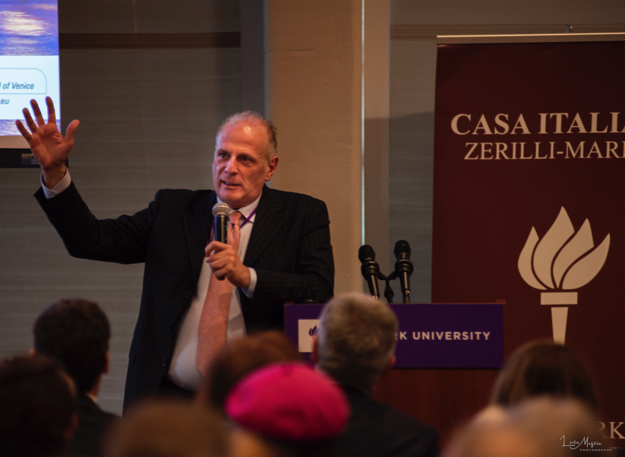


It’s September in New York. The rhythm starts to pick up again and, as always, the new academic year brings with it many new interesting initiatives across the various Italian Institutions here in the city. Among them is, of course, Casa Italiana Zerilli-Marimò [2] at New York University. So we headed there to meet with the Casa’s director, and our longtime friend, Stefano Albertini, who gave us a little preview of some of the most exciting events and projects they have in store.
This is a pivotal time in the history of Casa Italiana because, as the director tells us, it will see the implementation of their new project, Casa 2.0. “Thanks to the resources generously left to us by the Baroness Zerilli-Marimo (ed. The founder of Casa, who passed away in 2015) we will be able to not only present initiatives but also to create and produce them.”
A special committee was in fact instituted to come up with ideas and draft a long-term plan of how to allocate these newly acquired funds towards the development of the institution’s activities in this new phase of its existence.
This means that we can expect a whole new array of events that will not only be larger in scale but also more cohesive, rounded and engaging. These will range from the translation and publication of books in collaboration with Lorenzo da Ponte Library [3] (a collection by University of Toronto Press that publishes classic Italian books in English curated by prof Luigi Ballerini), to the production of plays, concerts, and exhibitions conceived and commissioned to fit specific spaces and contexts.
The first book Casa will help publish will likely be Voyage en Italie by the Marquis de Sade, so not really an Italian book but one that gives the perspective of a non-italian on Italy. “And this will potentially become the guideline for our upcoming literary projects: outside perspectives on Italy,” Prof. Albertini explains.
Each series will have a lead event. This year’s lead exhibition, for example, will be tied to the concept of Propaganda. It will feature works from the Cerulli collection in Bologna ranging from posters to flyers, manifestos, magazines, newspapers, and casts. These will include objects of political propaganda but also advertisements, allowing visitors to compare the two spheres and see where they intersect as well as providing an occasion to reflect on how the notion of propaganda has changed, and how it has remained the same.
Generally speaking, the idea is to focus on how the knowledge that comes from history, culture, and art can inform not only the past but also the present and especially the future.
This is something that Casa Italiana has already started doing to some degree. Prof. Albertini reminds us of a play they produced in the past based on the first feminist text in history, Il merito delle donne by Moderata Fonte [4]. The text was found in archive, translated, published and the Casa commissioned their theatre company to transform it into a performance. Now this very play will be presented in Florence in the context of Serena Dandini’s Festival delle Donne [5] (Women's Festival). “We are extremely proud that a production that was born basically in-house is ready to take off and land in Italy, where it will be presented in an ideal context.”
The director assures us that ongoing series such as ‘Adventure in Italian Opera with Fred Plotkin’ and ‘Dante and…’ (ed. where experts from different fields are invited to talk about Dante and his influence) will continue, but they will also intersect and expand. For example, on September 18, they will be hosting an event about Dante in Opera [6], which will bring together American conductor Michael Hurshell, Dante scholar Alison Cornish, and Opera expert Fred Plotkin.
“We try to connect our events,” Stefano continues, “so, for example, our exhibition on the drawings and writings of Carlo Levi [7] (ed. on view through Dec. 13) will be accompanied by an integral screening of Christ Stopped at Eboli [8].” (ed. the phenomenal 1979 film based on Levi’s most famous book)
The program will feature increasingly interdisciplinary approaches, bringing in experts from different fields to examine and interpret ideas from multiple perspectives. The idea for the future is to start delving into new fields, beyond the humanities, such as science, technology and even economics and politics.
Another particularity of the Casa is its ability to foster intercultural exchanges by bringing scholars, artists, and other leading figures from Italy in contact with their New York counterparts. “We don’t just want to have an Italian writer come here and present his book, we want him to stand alongside an American writer with whom he shares approaches, themes, interests and create an exchange. That’s what we can add as an American cultural institution, as a university.”
Prof. Albertini perfectly synthesizes the mission of Casa 2.0 by stating “I like the idea that Casa Italiana is center of cultural exchange between different worlds, a place which tries to bring them in contact, in dialog. It’s what we’ve always strived to do and it’s what we want to do even more.”
And we wish them the best of luck!
For more details on their upcoming events, visit Casa Italiana Zerilli-Marimò’s website. [2]
Source URL: http://ftp.iitaly.org/magazine/focus/art-culture/article/casa-20-new-initiatives-cultural-exchange
Links
[1] http://ftp.iitaly.org/files/screenshot2019-09-12at113323png
[2] http://www.casaitaliananyu.org/
[3] http://www.dapontelibrary.com/
[4] https://en.wikipedia.org/wiki/Moderata_Fonte
[5] https://ereditadelledonne.eu/
[6] http://www.casaitaliananyu.org/events/dante-and-opera
[7] http://www.iitaly.org/node/55413
[8] https://en.wikipedia.org/wiki/Christ_Stopped_at_Eboli_(film)